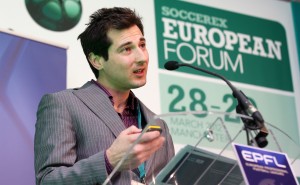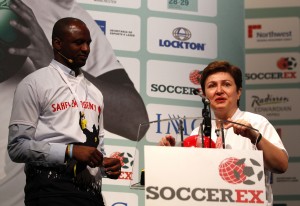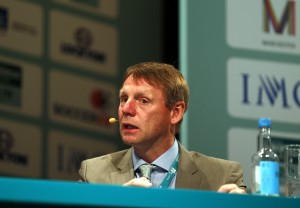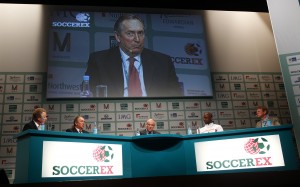Soccerex European Forum: Manchester (March 2012) – Player and Coach Development
Day 1: Wednesday 28 March 2012
11:30 – 12:45 Player and Coach Development
This session was divided into three parts. It began with a presentation from Raffaele Poli (Head of CIES Football Observatory – www.eurofootplayers.org), which looked at their findings on the most training-orientated clubs in Europe. This was followed by Patrick Vieira in his role as Goodwill Ambassador for the (FAO) Food and Agriculture Organisation (United Nations), providing a brief presentation promoting the ‘Professional Football Against Hunger’ campaign. The third and final part of the session centred on discussions about ‘Player and Coach Development’ involving, Vieira, Gerard Houllier, Stuart Pearce and David Sheepshanks.
1. Raffaele Poli (Head of CIES Football Observatory)

The International Centre for Sports Studies (CIES) is an independent study centre located in Neuchâtel, Switzerland. It was created in 1995 as a joint venture between FIFA, the University of Neuchâtel, the City and State of Neuchatel. The CIES Football Observatory is part of CIES Observatory project, dedicated to the statistical analysis of sport in all its diversity. For this presentation Raffaele Poli looked at how CIES took UEFA’s definition of club-trained players (a player who has been registered for a minimum of three seasons with the club between the age of 15 and 21), as a starting point to compare trends measured since 2005 in each of the European clubs championships, assessing the impact of the Home-grown Rule introduced in the Premier League since 2010/11. The report presented data relating to individual clubs, ranking those that are fielding the most club-trained, and those that have trained the most players present in the top league clubs.
2. Patrick Vieira (Goodwill Ambassador FAO)

Patrick Vieira along with Kristalina Georgieva of the European Commission Humanitarian Office took to the stage to promote the ‘Professional Football Against Hunger’ campaign. This is a joint initiative involving FAO, the European Union and the Association of European Professional Football Leagues (EPFL). There was a short video which highlighted the food crisis in the Sahel region of Africa where millions of people are facing hunger, and showed the efforts of the European Union and FAO to help people get back on their feet. This year’s ‘European Match Day Against Hunger’ will involve over 300 clubs in 20 leagues across 16 countries on the weekend of 30 March and 1 April 2012.
For more information visit:
www.endinghunger.org/en/actagitate/match_day_against_hunger_2012.html
3. Player and Coach Development
Mark Warburton (Director, Next Generation) [Moderator], Gerard Houllier (Former Liverpool and Lyon manager), Stuart Pearce (Manager England Under 21’s and GB Olympic Team), David Sheepshanks (Chairman St George’s Park/National Football Centre) and Patrick Vieira (Football Development Executive, Manchester City FC)
The debate opened with Stuart Pearce being asked what changes he believed would occur in the next 20 years in football. The caretaker England manager said that development in sports science would continue to advance and so have a positive impact for players, coaches and managers in the future. He added that advancement would continue so that players had the very best in terms of training, back-up, analysis and rehabilitation, all supported by world-class coaching. Pearce went onto say though that players had a responsibility themselves to take on board extra activities, whether that be analysis of their own game or additional training. In terms of finance, at the minute there is money in the game, but said who knows if that would be the case in 20 years time. However, he was excited by the St George’s Park scheme and its impact on the English game in the future, including providing more of a linked coaching structure between the full range of England teams, from Senior all the way to the Under 16’s.

Gerard Houllier said that at Clairefontaine there was a focus on skill and it was used to instil into the youngsters that it was about training to be a professional (maybe 6-7 years) as in other careers. Houllier was technical director from when the centre opened in 1988 and said that it was 10 years before the rewards emerged when France became World Champions in 1998 and European Champions in 2000. Given that then perhaps England could look forward to being World Champions in Qatar in 2022 with St George’s due to open later this year. He added that he believed that Spain had taken the French model and improved upon it, bringing team player development to a new height and reaping those rewards becoming European Champions in 2008 and World Champions in 2010.
Keeping within the subject of training facilities, David Sheepshanks told the audience that it was 1975 when the idea of a National facility in England was first discussed. He added that central to St George’s Park National Football Centre was the aim that it was coaching focused, but would also provide world-class facilities for players, administrators and officials alike. It will be all about coaching and support (for instance, sports medicine and sports science) and is a long-term project and strategy for success.
Patrick Vieira said that he felt fortunate to be part of a celebrated generation of French footballers. However, he said that many of those players stayed at the top because of their sacrifices, commitment and responsibility in looking after themselves; showing the importance of the player taking responsibility.
Mark Warburton asked Stuart Pearce, what would be considered to be a good year for an Academy. Pearce replied that in his opinion, no club would commit numbers to saying how many players should progress through. The important things were that players improved and had long careers, whether that be at their first club or elsewhere.
In relation to Grassroots football, Pearce believed that the change to the ‘Small-Pitch’ game for 8, 9 and 10 year olds would be beneficial aligned with a move away from the pressure of getting results. Training and development should be enjoyable and if a child had a good coach, they would be more likely to continue playing the game. David Sheepshanks added that for the first time roles for Age Specific Coaches will be developed, which will be paid jobs and provide a recognised career path.
The Elite Player Performance Plan (EPPP) would also bring benefits, as Stuart Pearce outlined that players would be at the centre of the development process and provided with the best opportunities in terms of coaching, access and education. However, both Patrick Vieira and Gerard Houllier believed that the issue around playing time for the 18-21 groups in England was an issue, in that lack of competitive playing time was a problem.

Stuart Pearce was asked with his ‘Olympic-hat’ on, whether the issue regarding the selection of players from some of the home countries had cast a negative shadow over the GB football team. Pearce responded that he was entirely positive about the situation and the players were his focus and he hoped that there would be a ‘feel-good’ factor created as three had been in England during Euro ’96.
In terms of player development, the panel was asked what part lower League clubs had to play in the process. Stuart Pearce said that staying involved at whatever level was important and that clubs, irrespective of status, had a duty of care, along with schools, parents, indeed anyone getting children into football, to make sure they encouraged the love of football.
Gerard Houllier added that as players got older there should be a suitable support mechanism in place, so that good habits, both on and off the pitch were instilled. Patrick Vieira believed that mentally preparing players for being in the first team was important and Stuart Pearce added that positive role models (from senior players) in the dressing room were vital.
The panel was asked whether the loaning of players from Premier League clubs to League 1 and 2 clubs is actually useful, since the way these clubs prepare will be different to the parent club. Stuart Pearce believed that the match experience and pressure is enough and it’s not all about the system played or the need to replicate the Premier League situation. A relegation battle for a young player can be a real and tough life experience. Gerard Houllier agreed, adding that the loan system provided players with mental toughness, but that no loan system existed in France, as the French have the B League. David Sheepshanks summarised that the loans system created a ‘win-win’ situation that was invaluable for Football League clubs. Patrick Vieira however, warned that clubs had to be careful where youngsters were sent because the pressure of winning could be detrimental if the player wasn’t mature enough to handle the situation. Stuart Pearce reasoned that there had to be a balance between competition and pressure and that developing and learning how to cope with losing was equally important as dealing with winning.
The final question asked about the role of traditional educations in Football Academies. Gerard Houllier said that in France, schools had a normal day of classes with football activities taking place afterwards. The Harefield Academy in North London (where Mark Warburton has been involved) was cited as an exemplary establishment where the Academy players trained with other athletes and got to play in the school teams.
Career Coaching Development objective is to create successful individuals that make a nation successful……………